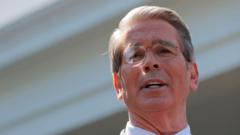With Treasury Secretary Scott Bessent stepping in as the main spokesperson for Trump's shifting tariff strategy, dynamics within the White House suggest a departure from hardline approaches, fueling market optimism amid ongoing trade tensions.**
The Altered Dynamics of Trump's Tariff Strategy: Who Holds the Reins?**

The Altered Dynamics of Trump's Tariff Strategy: Who Holds the Reins?**
As President Trump's tariff policy shifts, an unexpected player emerges at the forefront of decision-making, leaving markets and pundits speculating about the future.**
In a surprising turn of events, Treasury Secretary Scott Bessent has taken center stage in the ongoing saga of President Donald Trump’s tariff policy, eschewing his colleagues from Commerce and trade advisement, who once seemed to dominate the discourse. Just moments after the President announced a pause on sweeping "reciprocal" tariffs on April 9, Bessent, 62, soon became the face of the decision, proclaiming the shift required "great courage" amidst a room full of reporters.
Absent from this pivotal moment were hardline supporters of Trump's economic policies, such as Commerce Secretary Howard Lutnick and trade advisor Pete Navarro. Some analysts assert this incident illustrates the evolving power dynamics within Trump's administration, suggesting Bessent’s more negotiable stance aligns better with business expectations than the rigid inclinations of his counterparts.
Bessent's influence reportedly grew by engaging directly with Trump during key discussions over the weekend prior, potentially swaying him away from the brink of escalating tensions with international trade partners. Critics speculate it's Bessent’s previous reservations about tariffs and his extensive bond market experience that have enabled him to successfully reach the President, redirecting his focus toward economic stability.
Relations among tariff policy figures appear to be fractured and lack cohesive communication, as sources indicate Bessent has subtly usurped traditional roles, leading to market confusion. Bessent, now seen as the administration's go-to economic spokesperson, raised skepticism around Navarro's ongoing relevance while reflecting a notable change in approach from the administration’s usual hard-hitting tariffs rhetoric. The mixed messaging has, according to observers, induced unnecessary volatility in the markets, prompting calls for a more coordinated strategy moving forward.
As Trump and his team refocus, experts are optimistic that a clearer vision may ultimately boost market confidence, with Bessent potentially steering the economic conversation towards a more stable future. While speculation continues about the roles and influence of various key players, one thing remains certain: Tariff policy under Trump's leadership remains an unpredictable landscape.


















